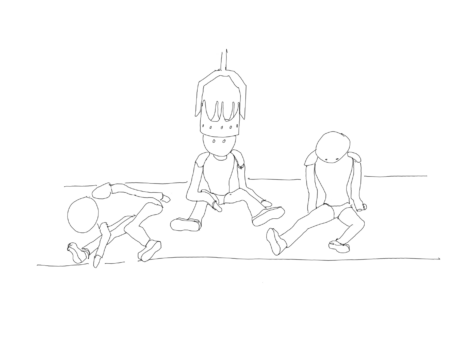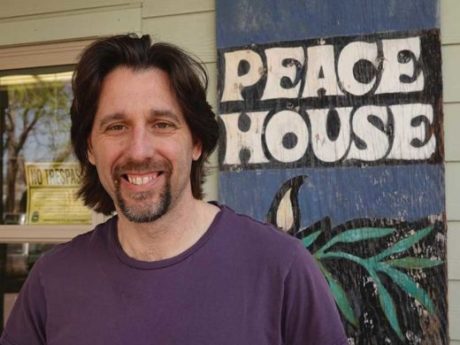from the series Peace House Community Journal…


I’ve had a hard time settling on a topic for this month’s column. I’m writing this about a week after the election, which is obviously a significant event, and the implications of the election results are big enough that I should probably say something. But you won’t read this until at least a couple of weeks from now because of the production and distribution times involved in publishing the alley. So if I say anything about the election, it will be outdated by the time you see this, at least in some respects.
There’s also the fact that I’m Canadian, living in the U.S. as a Permanent Resident without American citizenship. Emotionally, the election doesn’t have the same significance for me as it does for Americans, or for non-Americans with a less secure immigration status than I do. While I and almost everyone I know will be affected by the events of the next few years, I don’t feel that I should be jumping into someone else’s raw emotional situation with simplistic declarations about what I think happened or should happen. There will be time for my words and actions, but this isn’t it.
What I do feel comfortable saying is that this will pass. However someone voted or didn’t vote in the election, whether this is a time of elation or despair, it is transitory. Whatever you think of the American political system, you can’t escape the fact that it was designed to prevent dynasties. It is in constant flux as power within each part of the government shifts, and as the relationships between those parts freeze or thaw.
I’ve heard about a couple of “dynasties” in American politics, but those have usually been hypothetical discussions. The Kennedys were probably the closest to achieving a dynasty, but John F. Kennedy’s presidency lasted less than three years, and no other Kennedy achieved the presidency. Robert was influential for a brief period, and Ted Kennedy had a long career in the Senate. Influential, yes, but not a dynasty.
The Bushes were a dynasty candidate. The first Bush presidency lasted four years, and the second lasted eight. Jeb Bush was touted as the next in line for the dynasty, but he never even got close to the Republican nomination for president. The Clintons were the other possible dynasty, but that stalled out as well.
Even before term limits, dynasties never took hold in America. John Adams and John Quincy Adams, father and son, held the presidency for a combined eight years. Franklin Delano Roosevelt holds the record for the longest time in office, having won four elections. Could he have won a fifth if he lived to the next election? Maybe, but if you look at the exceptional individual, and then assume that his exceptionality would have been even greater if reality hadn’t gotten in the way, to argue for an American dynasty, you’re on thin ice.
My point is simple: however you feel about the current political climate, it will change. Whether you are celebrating or crying, the system is designed to make the moment pass. No one should get carried away by either the joy or the despair.
This assumes, of course, that Americans work to preserve the safeguards that were built into the system, and that will be the big test. Those with power always want to keep it, sometimes by ethical means and sometimes not. If those from both sides, regardless of who has the power at that particular moment, focus on the reason the U.S. political system was set up as it is, and treasure its long-term values over short-term power, they will keep the dynasties at bay.
Marti Maltby is an avid cyclist, Director at Peace House Community, and an obnoxiously proud Canadian.









